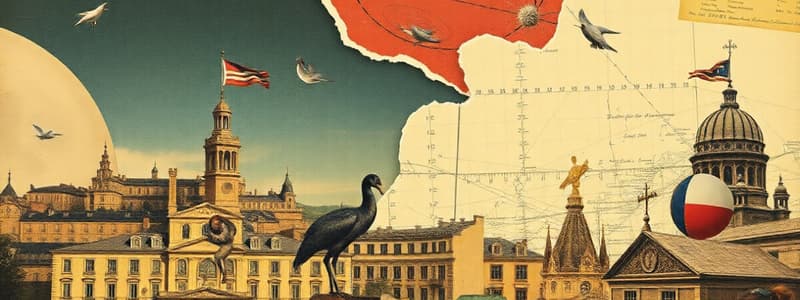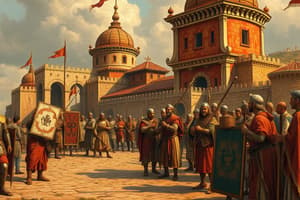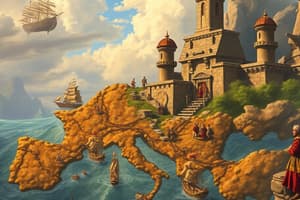Podcast
Questions and Answers
What was a primary motivation for European exploration in the early 1400s?
What was a primary motivation for European exploration in the early 1400s?
- Need to escape political conflicts in Europe
- Desire to establish colonies in the Americas
- A quest for scientific knowledge about the Earth
- Search for new trade routes and wealth (correct)
Which of the following technologies significantly advanced European exploration?
Which of the following technologies significantly advanced European exploration?
- Use of magnetic compasses and improved ship designs (correct)
- Construction of larger land armies
- Invention of the steam engine
- Development of advanced navigational maps
Who was a significant figure in early European exploration known for reaching the court of Kublai Khan?
Who was a significant figure in early European exploration known for reaching the court of Kublai Khan?
- Ferdinand Magellan
- Christopher Columbus
- Vasco da Gama
- Marco Polo (correct)
What phrase encapsulated the motivations behind European explorations in the 1400s?
What phrase encapsulated the motivations behind European explorations in the 1400s?
What change in attitude among Europeans encouraged exploration in the early 1400s?
What change in attitude among Europeans encouraged exploration in the early 1400s?
Which European power was notably involved in early exploration and trade in Asia?
Which European power was notably involved in early exploration and trade in Asia?
What was one consequence of the European crusades that influenced later exploration?
What was one consequence of the European crusades that influenced later exploration?
What was a major shift in European interaction with the world by the early 1400s?
What was a major shift in European interaction with the world by the early 1400s?
What was Bartolomeu Dias known for in the context of European exploration?
What was Bartolomeu Dias known for in the context of European exploration?
What was the significance of the Treaty of Tordesillas?
What was the significance of the Treaty of Tordesillas?
What was a primary reason for the high prices of spices in Europe after the Crusades?
What was a primary reason for the high prices of spices in Europe after the Crusades?
Which groups controlled the trade routes from East to West after the Crusades?
Which groups controlled the trade routes from East to West after the Crusades?
What motivated European merchants in the 1400s to seek new trade routes?
What motivated European merchants in the 1400s to seek new trade routes?
What impact did the Crusades have on European tastes?
What impact did the Crusades have on European tastes?
How did the control of spice trade affect European prices?
How did the control of spice trade affect European prices?
What dual purpose motivated European exploration during the Age of Exploration?
What dual purpose motivated European exploration during the Age of Exploration?
What was a consequence of the European demand for Asian spices?
What was a consequence of the European demand for Asian spices?
What did the Europeans seek to achieve by bypassing Italian merchants?
What did the Europeans seek to achieve by bypassing Italian merchants?
Which of the following spices was NOT mentioned as being in high demand in Europe?
Which of the following spices was NOT mentioned as being in high demand in Europe?
What legacy did the Crusades leave regarding European views towards Muslims?
What legacy did the Crusades leave regarding European views towards Muslims?
What did Europeans primarily hope to achieve through exploration in addition to obtaining goods?
What did Europeans primarily hope to achieve through exploration in addition to obtaining goods?
Which statement accurately reflects Bartolomeu Dias's exploration motives?
Which statement accurately reflects Bartolomeu Dias's exploration motives?
What were the three primary motives for exploration as summarized in the text?
What were the three primary motives for exploration as summarized in the text?
What role did technological advances play in exploration during the 1200s?
What role did technological advances play in exploration during the 1200s?
What did Bartolomeu Dias aim to provide to those in 'darkness' as stated in his motivations?
What did Bartolomeu Dias aim to provide to those in 'darkness' as stated in his motivations?
During the 1200s, what was one significant challenge for European sea captains?
During the 1200s, what was one significant challenge for European sea captains?
In the context of exploration, what does the phrase 'growing rich as all men desire to do' imply?
In the context of exploration, what does the phrase 'growing rich as all men desire to do' imply?
Which of the following accurately describes the relationship between exploration motives and the technology of the time?
Which of the following accurately describes the relationship between exploration motives and the technology of the time?
What aspect of European exploration does the phrase 'to give light to those who were in darkness' reflect?
What aspect of European exploration does the phrase 'to give light to those who were in darkness' reflect?
What can be inferred about the motivation for exploration based on the phrase 'God, glory, and gold'?
What can be inferred about the motivation for exploration based on the phrase 'God, glory, and gold'?
Flashcards are hidden until you start studying
Study Notes
Overview of European Exploration
- European exploration began in the early 1400s, fueled by the Renaissance's spirit of adventure and curiosity.
- The phrase "God, Glory, and Gold" encapsulates the main motivations for exploration: religious zeal, national pride, and the pursuit of wealth.
Background Context
- Prior to the 1400s, interactions with the East were limited, primarily through the Crusades (1096-1270) which increased European exposure to Asian goods.
- Marco Polo's journey to Kublai Khan's court in China in 1275 opened European eyes to the wealth and cultures of Asia.
Economic Motivations
- The demand for spices and luxury goods from Asia surged, particularly after the Crusades.
- High prices charged by Muslim and Italian merchants for these goods created a desire among European traders to bypass these intermediaries.
- The competition among European nations (England, Spain, Portugal, France) led to initiatives for opening direct sea routes to Asia.
Religious Motivations
- Crusades fostered a sense of duty among Europeans to continue their conflicts with Muslims and also to convert non-Christians.
- Bartolomeu Dias articulated this dual goal: to serve God, enlighten others, and achieve personal wealth.
Technological Advancements
- Significant advancements in sailing technology during this period made long ocean voyages possible.
- Innovations in navigation and shipbuilding allowed explorers to travel greater distances more effectively.
Key Figures and Entities
- Bartolomeu Dias: Early Portuguese explorer known for his contributions to maritime exploration.
- Vasco da Gama: Another pivotal figure in establishing sea routes to Asia.
- Prince Henry the Navigator: Instrumental in promoting exploration and advancements in navigation.
- Treaty of Tordesillas: Agreement aimed at dividing newly discovered lands between Spain and Portugal.
- Dutch East India Company: Important trading entity formed to pursue Asian trade directly, reflecting European interests in the lucrative spice trade.
Studying That Suits You
Use AI to generate personalized quizzes and flashcards to suit your learning preferences.




